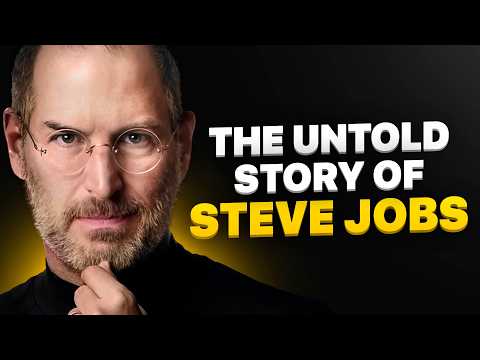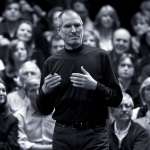
title

The year is **2007**, and the tech world is about to change forever. Inside the packed auditorium at **Moscone Center**, a man wearing his trademark **black turtleneck** and **blue jeans** steps onto the stage, holding in his hands what would soon become one of the most influential devices in modern history. “Today, Apple reinvents the phone,” he declares, and with that, **Steve Jobs** sets into motion a new era of technology. Jobs, a **visionary entrepreneur**, didn’t just create products—he **shaped the future**. But the path that led him to this monumental moment was filled with **challenges, failures, and triumphs**.
Steve Jobs’ life is a testament to the **complexity of genius**. He was a man who inspired millions with his innovations but was also known for his **contradictory personality**. Today, we’ll take a deep dive into the life of Steve Jobs—the **innovator**, the **leader**, and the **enigma**. We’ll explore his journey from a child put up for adoption to becoming the **driving force** behind **Apple**, revolutionizing industries, and transforming the way we interact with technology.
The Early Life of Steve Jobs: Adoption and Identity
Born on **February 24, 1955**, in San Francisco, **Steven Paul Jobs** was the child of **Joanne Schieble** and **Abdulfattah Jandali**, two graduate students unprepared for parenthood. Their decision to give Steve up for adoption set the stage for one of the most **intriguing life stories** of the 20th century. Steve was adopted by **Paul and Clara Jobs**, a working-class couple from **Mountain View, California**, an area that would later become the **Silicon Valley**.
Steve’s relationship with his adoptive parents was loving, but his **adoption** always weighed heavily on his identity. His parents assured him he was **“specially chosen”**, but the lingering feeling of being both **chosen** and **rejected** created an internal conflict that shaped his personality and **drive for success**. This **duality** would be a driving force throughout his life, making him feel like both an **insider** and an **outsider** in the tech world.
The Roots of a Tech Genius: Growing Up in Silicon Valley
Growing up in what would later become **Silicon Valley**, Steve Jobs was immersed in a world of **technology and innovation** from an early age. His father, a mechanic, and carpenter, would teach Steve how to build and disassemble electronics, sparking his **lifelong fascination** with the technical world. But Jobs was no ordinary child—his intelligence was **matched by his rebellious spirit**. He was often a troublemaker in school, uninterested in the structured learning environment.
A key turning point came in the **fourth grade** when his teacher, **Mrs. Hill**, discovered a way to engage Steve. She offered him **$5** for every math problem he solved, sparking his interest in academics. It was around this time that Jobs developed an interest in **electronics** and met **Steve Wozniak**, the man who would become his **lifelong collaborator** and the co-founder of Apple.
The Birth of Apple: From Garage to Global Empire
In **1976**, at the age of 21, Steve Jobs, along with Steve Wozniak, founded **Apple Computer** in Jobs’ parents’ garage. Their first product, the **Apple I**, was a computer board that tech enthusiasts could assemble themselves. Jobs had a keen eye for **business potential**, and when Wozniak demonstrated the Apple I at the **Homebrew Computer Club**, Jobs saw the future.
It wasn’t long before they were making strides with the **Apple II**, a personal computer in an **elegant plastic case** with color graphics. This computer revolutionized the industry, setting the stage for **Apple’s rapid growth**. By **1980**, Apple’s revenue reached **$117 million**, and the company went public, making Steve Jobs a **multimillionaire** overnight.
The Rise and Fall: Jobs’ Ouster from Apple
Despite Apple’s early success, Jobs’ **management style** was often described as **harsh** and **demanding**. His relentless pursuit of **perfection** led to constant **friction** with the company’s executives and employees. In **1983**, Jobs recruited **John Sculley**, a seasoned executive from Pepsi, to be Apple’s CEO, famously asking him, “Do you want to sell sugared water for the rest of your life, or do you want to come with me and change the world?”
However, by **1985**, tensions between Jobs and Sculley had reached a boiling point, and in an unexpected turn of events, Jobs was **removed from Apple**, the very company he had founded. It was a **devastating blow** to Jobs, who admitted years later that he felt like he had “let the baton fall” for the next generation of entrepreneurs.
NeXT and Pixar: Building the Foundations of the Future
After being ousted from Apple, Jobs didn’t give up. In **1985**, he founded **NeXT**, a company that aimed to build powerful **workstations for education and business**. While **NeXT computers** were not a commercial success due to their high price, they were **technologically advanced**. In fact, **Tim Berners-Lee** used a NeXT computer to develop the **World Wide Web**, revolutionizing the internet.
In **1986**, Jobs also acquired the computer graphics division of **Lucasfilm** for **$10 million** and turned it into **Pixar**, a company that would later become a powerhouse in the **animation industry**. With the release of **Toy Story** in **1995**, the world’s first **computer-animated film**, Pixar achieved massive success, grossing **$373.5 million** worldwide and solidifying Jobs’ place in the entertainment industry.
The Return to Apple: Rebuilding the Empire
By the mid-1990s, Apple was struggling. The company had lost its innovative edge, and its financial situation was deteriorating. In **1997**, in a twist of fate, Apple acquired NeXT, bringing Jobs back to the company as **interim CEO**. Jobs quickly began to **restructure** Apple, canceling unprofitable projects and refocusing the company on creating a **simpler, more innovative product line**.
The first major success under Jobs’ renewed leadership was the **iMac**, launched in **1998**. With its sleek design and ease of use, the iMac became a **huge success**, selling over **6 million units**. This marked the beginning of Apple’s **renaissance**, and Jobs’ visionary leadership led to the development of some of the most **iconic products** in tech history.
The Digital Revolution: iPod, iPhone, and iPad
Under Jobs’ leadership, Apple didn’t just recover—it led a **digital revolution**. In **2001**, the company introduced the **iPod**, a portable music player that forever changed the music industry. With its ability to store **“1000 songs in your pocket,”** the iPod quickly became a cultural phenomenon, selling over **400 million units** by 2014.
In **2007**, Jobs unveiled the **iPhone**, which combined a **phone**, an **iPod**, and an **internet communicator** into a single device. The iPhone’s **revolutionary touch interface** and **app ecosystem** transformed the smartphone industry and changed how people interact with technology. It wasn’t just a phone—it was a **pocket computer**, camera, and entertainment hub.
Just a few years later, Jobs introduced the **iPad** in **2010**, a tablet computer that bridged the gap between smartphones and laptops. While initial reactions were mixed, the iPad quickly became a **bestseller**, solidifying Apple’s dominance in the tech market.
Steve Jobs: The Man Behind the Curtain
Despite his business success, Jobs’ **personal life** was filled with contradictions. He had a daughter, **Lisa**, with **Chrisann Brennan**, but for years, he denied **paternity**. It wasn’t until later in life, after marrying **Laurene Powell** and having three more children, that Jobs began to reconcile with Lisa.
Jobs was also known for his **intense personality**. His **pursuit of perfection** often made him **difficult to work with**. Former employees frequently described him as **ruthless**, quick to dismiss ideas he didn’t like, and capable of **publicly humiliating** those who didn’t meet his standards.
Jobs’ approach to **philanthropy** also drew criticism. Unlike other billionaires like **Bill Gates**, Jobs was not known for his charitable work, and one of his first actions upon returning to Apple was to shut down the company’s **philanthropic programs**. Jobs believed the best way to help society was to **make Apple profitable**.
Health Struggles: The Final Battle
In **2003**, Jobs was diagnosed with a **rare form of pancreatic cancer**. True to his independent nature, he initially resisted surgery, opting for **alternative treatments** instead. Unfortunately, this decision may have cost him precious time. By the time he agreed to surgery, the cancer had spread.
Despite his illness, Jobs continued to lead Apple, overseeing the company’s development of groundbreaking products like the **iPhone** and **iPad**. His determination to continue working even as his health declined was both a testament to his **obsession with innovation** and a reflection of his **unrelenting work ethic**.
In **2009**, Jobs underwent a **liver transplant**, but his health continued to deteriorate. On **August 24, 2011**, Steve Jobs officially stepped down as **CEO of Apple**, handing the reins to **Tim Cook**. His resignation letter was brief but heartfelt:
“I have always said if there ever came a day when I could no longer meet my duties and expectations as Apple’s CEO, I would be the first to let you know. Unfortunately, that day has come.”
On **October 5, 2011**, Steve Jobs passed away at the age of **56**. His last words, spoken on his deathbed, were cryptic yet profound: **“Oh wow. Oh wow. Oh wow.”** They remain a mystery, leaving the world to wonder what he saw or understood in those final moments.
The Complex Legacy of Steve Jobs
Steve Jobs left behind a **legacy** that is as **complex** as it is **monumental**. He wasn’t just a **tech entrepreneur**; he was a man who **revolutionized** multiple industries—**personal computing**, **animation**, **music**, **telecommunications**, and **consumer electronics**. His ability to see beyond the present and **envision** the future of technology was unparalleled.
But Jobs was also a man of **contradictions**. He was capable of **great vision** but could be **harsh** and **unforgiving**. His **ruthlessness** in business was often as pronounced as his **creativity**. His **reality distortion field**, as it was famously called, allowed him to **convince** others to push beyond what they thought possible, but it also made him blind to his own **limitations**.
Jobs’ **management style** has been both **praised** and **criticized**. Many believe that his **demand for perfection** and his ability to **motivate** people created **innovative breakthroughs** that would have been impossible otherwise. Others argue that his **abrasive** approach alienated people and caused unnecessary strife within the company.
Ultimately, Jobs’ legacy lies in the **products** and **experiences** he created. The **iPhone**, **iPod**, **iPad**, and **Macintosh** are not just devices—they are **cultural icons** that have influenced the way billions of people around the world **work**, **communicate**, and **entertain** themselves. Jobs didn’t just change **technology**; he changed the way we **live**.
Lessons for Future Innovators
There are many **lessons** that can be learned from Steve Jobs’ life, both **positive** and **negative**. One of the most important is the **power of focus**. Jobs often said that **“focusing is about saying no.”** His ability to **narrow Apple’s product line** to just a few key items after returning to the company in the late 1990s was crucial to its resurgence.
Jobs also believed in the importance of **design** and **user experience**. He understood that technology should not only be **functional** but also **intuitive** and **beautiful**. This philosophy was at the heart of every product Apple developed under his leadership, from the **clean lines** of the Macintosh to the **minimalist elegance** of the iPhone.
Another key lesson from Jobs is the **value of interdisciplinary thinking**. Jobs was not just a **technologist**—he was a man who loved **art**, **design**, and **philosophy**. He believed that the **intersection** of **technology** and the **liberal arts** was where the greatest innovations would occur, a belief that is reflected in Apple’s products, which are as much about **form** as they are about **function**.
Finally, Jobs taught us the importance of **passion**. He often said that **“the only way to do great work is to love what you do.”** This passion drove him through **failure**, **criticism**, and even **illness**. It was this **relentless drive** that allowed Jobs to bounce back from being ousted from Apple in the 1980s and turn the company into one of the **most valuable businesses** in the world.
Conclusion: The Enduring Influence of Steve Jobs
Steve Jobs was an **iconoclast** in the truest sense of the word. He **challenged conventions**, **broke boundaries**, and **redefined** industries. His ability to **dream big** and turn those dreams into reality is what set him apart from the rest. While his **management style** may have been **controversial**, there is no denying the **impact** he had on **technology**, **business**, and **culture**.
His life story is one of **resilience**, **vision**, and a **willingness to take risks**. Jobs once said, **“Your time is limited, so don’t waste it living someone else’s life.”** He lived by that mantra, and in doing so, he inspired countless others to pursue their own **visions**, no matter the **obstacles**.
Today, Apple continues to be a testament to Steve Jobs’ **vision**. The products he helped create have become **integral** parts of modern life, and his **influence** can be seen in **every smartphone**, **tablet**, and **personal computer**. The man behind Apple may be gone, but his **legacy** will continue to shape the world for **generations to come**.
**So, what do you think?**
What part of Steve Jobs’ **personality** or **leadership style** do you think contributed most to his success? Could Apple have achieved the same level of innovation under a **different** leader, or was Jobs’ **unique** approach the secret to its success? And which **Apple product** has had the greatest impact on **your life**?
Let us know your thoughts in the comments!







 Bengali
Bengali Chinese (Simplified)
Chinese (Simplified) English
English Hindi
Hindi Indonesian
Indonesian Irish
Irish Spanish
Spanish Swedish
Swedish Turkish
Turkish